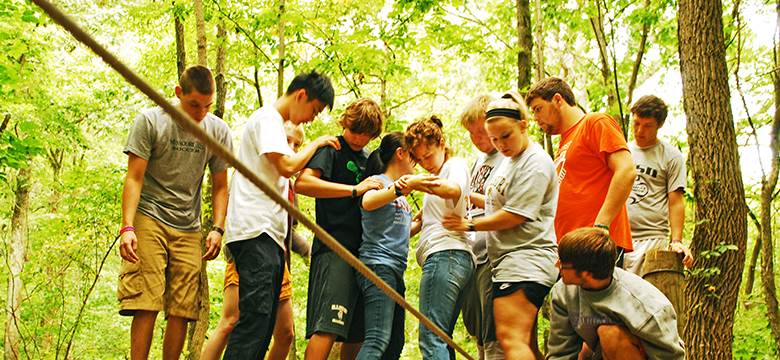 We'll call her "Jill." She was hanging from a cable 25' in the air, and she was terrified! She was participating in the high ropes course at Lake Williamson, and each step for this 17-year old was an effort of will. When she reached the deck, she gave me a relieved smile and announced, "I did it." I looked back with a bemused expression and said, "That's great. What about your partner?"
We'll call her "Jill." She was hanging from a cable 25' in the air, and she was terrified! She was participating in the high ropes course at Lake Williamson, and each step for this 17-year old was an effort of will. When she reached the deck, she gave me a relieved smile and announced, "I did it." I looked back with a bemused expression and said, "That's great. What about your partner?"
The challenge had been to cross the twenty-foot span of cables and ropes with their partners. As Jill looked back, she realized her partner had not even taken the first step. Jill looked at me with one of those "if-looks-could-kill" expressions and spat, "You're going to make me go back there are you." I shrugged my shoulders and stated, "I'm not going to make you do anything. But that is your partner, and it looks like she really could use your help."
I received another icy glare and watched Jill slowly make her way back. She met her partner at the next deck, offered a few words of encouragement, and started back together. This time I noticed a significant change: Jill was still scared, but her fear seemed to be held in check. Jill wasn't shaking. Jill wasn't near tears. Her only words were those meant to help your partner.
As they reached their destination, Jill gave an even bigger smile and told me the last time across wasn't so bad. I smiled back and asked, "What did you just learn from that?"
Jill's response was amazing! "When I take my eyes off my own problems and put them on other people's needs, my problems don't seem so big." WOW! Talk about empowerment!
Earlier this year I was at a conference where a social worker was conveying something I had known for years: Psychologists are finally recognizing the "self-esteem" movement of the 1990's and 2000's is creating a generation of kids who feel good about themselves, but don't perform at the same level as previous generations, nor are they reaching the markers of adulthood as early as their ancestors.
The psychological buzz word these days is "self-efficacy." Self-efficacy is the ability to produce an outcome and to reach a goal. In layman's terms, we call it "empowerment." Psychology Today writer, Robert Wilson, argues we gain empowerment from four areas: observation of others, personal experience, a positive mental attitude, and from the encouragement of others.[1]
Let's go back to Jill on the high ropes course. As scared as she was, she had already observed others cross the span and knew it was humanly possible to complete it. By the time she got her partner her across, she had experienced the span three times. On her last pass, her mental focus was on her partner. In turn, Jill's partner was empowered to try through Jill's example and direct encouragement.
I would submit that today's young people don't need more pep talks to make them feel better about themselves. They don't need a "participation trophy." They don't need a redefined meaning of the school "honor roll." What they need is to be empowered by being challenged.
If you are working with youth, are you giving them easy answers and passive programs, or are you challenging them to grow in their faith? Are your students leaving your youth service on a feel-good emotional high, or are they leaving to wrestle with the questions of moral character, spiritual choices, and personal integrity. In other words, are you spoon feeding them Christian entertainment or empowering them with the "meat" of God's Word.
[1] http://www.psychologytoday.com/blog/the-main-ingredient/200912/copy-cats-climb-the-ladder-success-faster